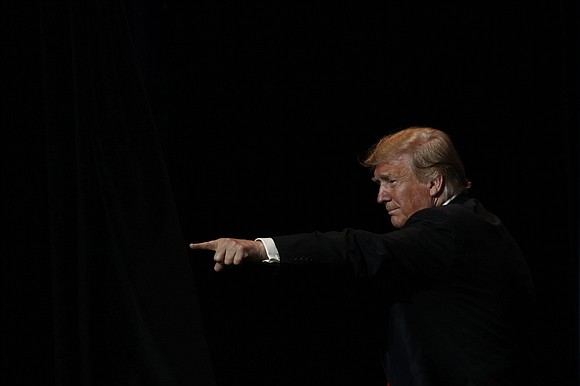Fact-checking Trump's CNBC interview
CNN/Stylemagazine.com Newswire | 6/10/2019, 1:26 p.m.

By Holmes Lybrand, Lydia DePillis, Maegan Vazquez and Donna Borak, CNN
(CNN) -- During his Monday morning interview with CNBC, President Donald Trump claimed that China has "lost 15 to 20 trillion dollars in value since the day I was elected."
Facts First: This isn't even close to true; nor is it clear what Trump is actually referencing here. The entire size of the Chinese economy is estimated to be around $13 trillion, so it's impossible for it to lose more than it is worth. On top of that, China's economy has continued to expand during Trump's time in office.
China's GDP growth has remained above 6% since Trump was elected in November 2016. While Chinese economic growth has started to slow, that trend was already underway before Trump was elected.
In 2017, China's GDP was $12.238 trillion, according to the World Bank. While current estimates are hard to come by, China's economy grew by 6.6% in 2018, which would put the size of the economy just over $13 trillion.
If China were to lose $15 to $20 trillion it would completely wipe the country off the face of the world's economic map.
The bigger point Trump seems to be making here is that his trade policies are hurting China's economy. That at least does carry a kernel of truth. (As economists have noted, however, the US economy is harmed by these tariffs as well.)
Since his first round of tariffs against China went into effect last summer, US imports from China have dropped sharply, as companies have begun to switch their sourcing to other East Asian countries like Vietnam. In the first 4 months of 2019, Americans imported about 12% less from China compared to the same period last year.
According to the research firm Capital Economics, the 25% tariff on all Chinese goods that Trump is set to impose could shave 0.8 percentage points off China's GDP. Just under half of that GDP decrease, Capital Economics estimates, should have already happened due to lower tariffs on intermediate goods such as steel.
Over the course of a year, this estimated 0.8% hit could account for roughly $100 billion dollars -- nowhere near Trump's $15 to $20 trillion figure.
French Wine
'Trump hinted at potential action against France over the price of wine during his phone interview with CNBC.
"You know, France charges us a lot for the wine. And yet we charge them very little for (American) wine. So the wineries come to me and say, 'Sir,' the California guys they come, 'Sir, we're paying a lot of money to put our product into France and you're letting, meaning this country, is allowing this French wine -- which are some great wines, but we have great wines too -- allowing it to come in for nothing. It's not fair,'" Trump said.
"And you know what? It's not fair. We'll do something about it," he continued.
Facts First: This isn't quite true. While US tariffs on wine from the European Union are smaller than the EU's tariff on American wine, according to the Wine Institute, contrary to what Trump said, the US does not allow French wine "to come in for nothing."
The EU's import tariff on wine for a 750 ml bottle "can range from $0.11 to 0.29, depending on the type alcoholic content of the wine," the Institute states. By comparison, "the US import tariff on a 750 ml bottle is $0.05 for still wine and $0.14 for sparkling wine."
And while the US and EU maintain a 2006 agreement on wine trade, the institute argues that the EU has since "created certain restrictions that increase costs or otherwise affect the ability of US wine to compete in the EU."
One main restriction comes in the form of a certification for wine imports from the US. The US doesn't have similar certification for French wine imports.
Another restriction that makes it more difficult for American wine producers to sell in Europe is a limit on the use of common wine descriptors, including "chateau," "clos," "tawny," and "ruby" for their products.
What Trump will actually do about the price of wine is unclear, but the President threatened tariffs on France's wines -- part of a larger tariff threat against the European Union -- late last year.
"France makes excellent wine, but so does the U.S. The problem is that France makes it very hard for the U.S. to sell its wines into France, and charges big Tariffs, whereas the U.S. makes it easy for French wines, and charges very small Tariffs. Not fair, must change!" Trump tweeted last November.
European wine and cheese were also among the goods the US Trade Representative's office threatened to place tariffs on in April.








